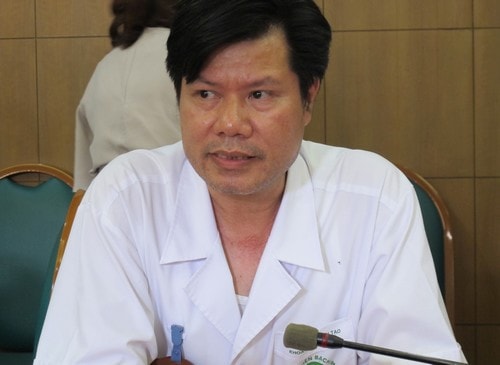Extremely toxic substances in dialysis water cause strokes in 18 people in Hoa Binh
Fluorine is an extremely toxic chemical that is absolutely not used in medicine, but it is present in dialysis water, causing complications for 18 patients in Hoa Binh.
Speaking to the press on the morning of July 4, Dr. Nguyen Gia Binh, Head of the Intensive Care Unit, Bach Mai Hospital (Hanoi) confirmed that the residual fluoride content was hundreds of times higher in the dialysis water at Hoa Binh General Hospital at the end of May, causing 18 people to have complications, which could have killed the dialysis patients immediately.
According to Dr. Nguyen Huu Dung, Head of the Kidney Department, Bach Mai Hospital (Hanoi), currently the world only allows the medical industry to use 3 types of chemicals according to international general guidelines, which do not include fluorine.Natural water sources contain fluoride but only up to a maximum of 0.2 mg/ml.
Master Nguyen Trung Nguyen, Head of the Poison Control Center, Bach Mai Hospital (Hanoi) also emphasized that fluorine, symbol F, is a very toxic chemical, absolutely not used in medicine but only used in industry and some types of dirt removers. "Therefore, the appearance of fluorine at high concentrations in the dialysis water sample at Hoa Binh General Hospital on the morning of May 29, as announced by the investigation agency, is unusual," Master Nguyen shared. According to him, this chemical is included in the water treatment process, not naturally occurring.
World medical literature has recorded two cases of poisoning of people on dialysis in the US caused by fluoride chemicals in the water system.
 |
According to Dr. Dung, according to the normal hemodialysis process, on days when there is no cleaning of pipes, filters, etc., before the first hemodialysis session in the early morning, the medical staff on duty turns on the RO machine to observe 3 parameters including flow, pressure and TDS or total ion content in the water. If these 3 parameters meet the standards, the machine is turned on, the doctor examines the patient and prescribes hemodialysis as usual.
On days when cleaning of machinery systems such as RO membranes, pipes, etc., doctors or hospital directors can be assigned to sign a contract with a qualified unit to perform the task. The supply department is responsible for supervising the entire cleaning process, from receiving to finishing, there is a handover. The person who receives the task signs with the supervisor that the task has been completed, the quality is guaranteed. The next morning, the on-duty staff will still carry out the machine inspection as usual.
Periodically, the department conducts microbiological, toxicological and physical-chemical tests with 23 parameters (including fluoride index). However, Dr. Dung affirmed that cleaning pipes and testing water quality are two independent tasks. For example, physical-chemical tests are performed 1-2 times a year, to test all 23 parameters, it takes at least 10 days to get results.Therefore, after cleaning the dialysis water pipes, there is no regulation to check the fluoride content (because it is not allowed to be used in principle), and if tested, the results cannot be given immediately. Therefore, the key is the issue of controlling the substances used to clean the pipes.
"In the dialysis accident at Hoa Binh General Hospital, the filtration unit arbitrarily introduced chemicals that were not allowed to be used, so it must bear the highest responsibility; then the material department staff did not control carefully before accepting the product. The doctor is only in charge of the expertise, and cannot control all parameters during the maintenance process," said Dr. Dung.
Professor Binh affirmed that the dialysis accident at Hoa Binh General Hospital was an unexpected incident. "We hope that the authorities will handle the right person for the right crime, have a happy ending, and limit mistakes so that medical staff can work with peace of mind," Professor Binh shared.
On the morning of May 29, 18 patients with chronic kidney failure undergoing dialysis at Hoa Binh General Hospital suddenly showed signs of abnormality. 8 people died one after another; 10 people were transferred to Bach Mai Hospital that night and are now in good health. Authorities determined that the cause of the 8 patients' deaths was the water supply for the filtration and dialysis process; the equipment was maintained and put into operation without proper inspection.
The police initiated a case and detained three people, including Dr. Hoang Cong Luong of the Intensive Care Unit at Hoa Binh General Hospital. The Association of Emergency Resuscitation and Anti-Poisoning said that Dr. Luong's shortcomings were "administrative procedural shortcomings." The Ministry of Health also requested the Ministry of Public Security to consider releasing Dr. Luong on bail.
According to VNE
| RELATED NEWS |
|---|
